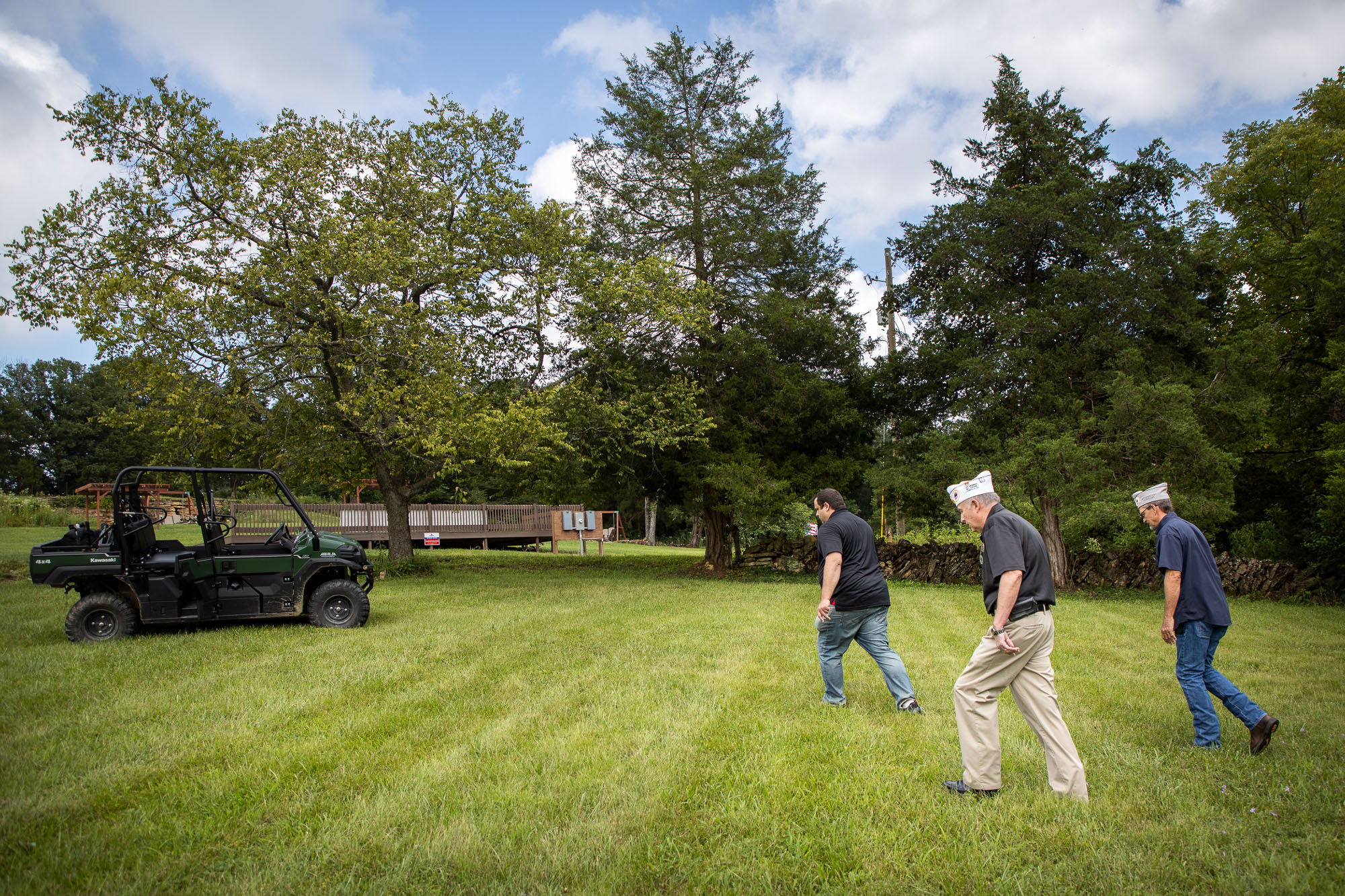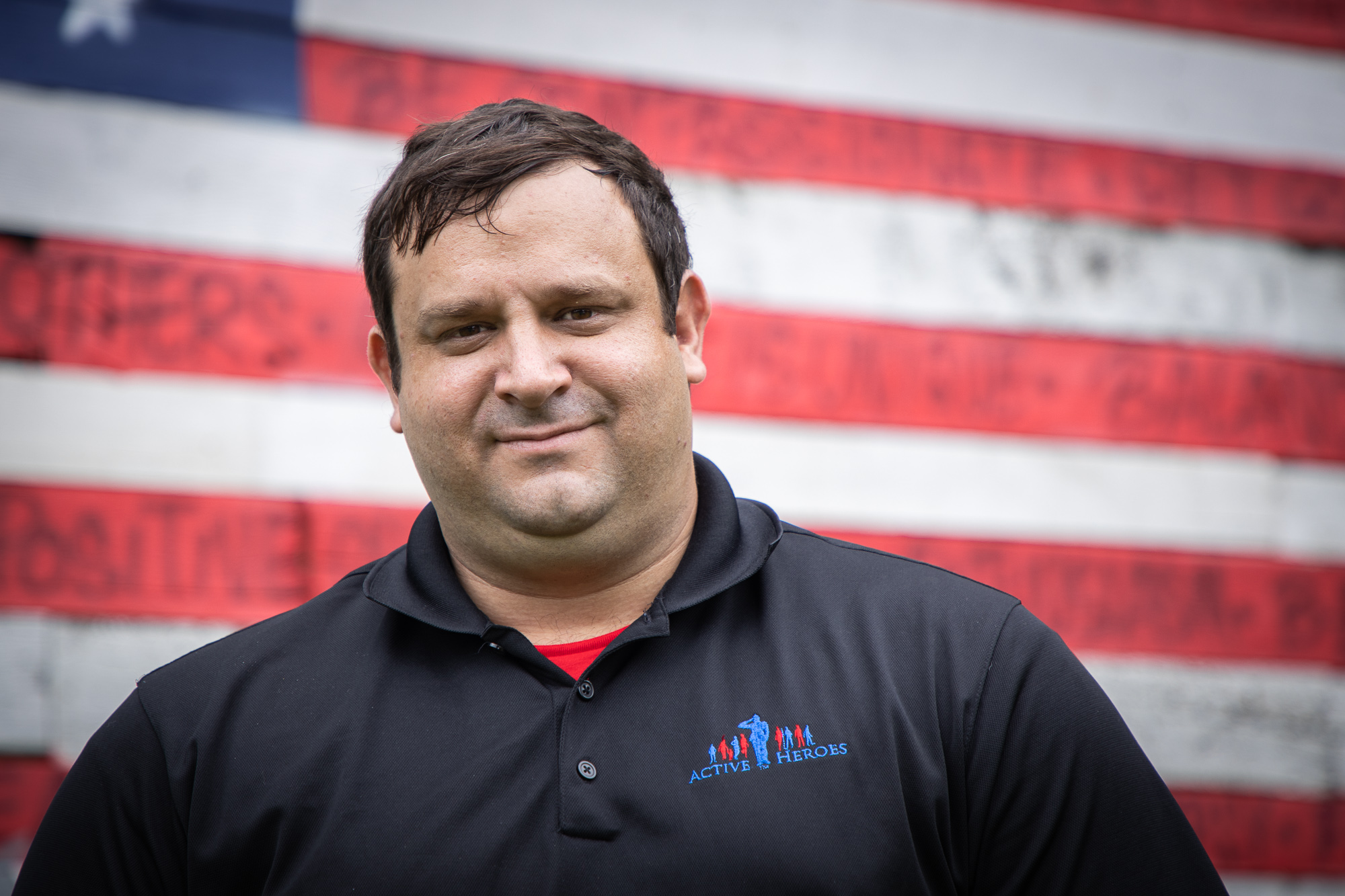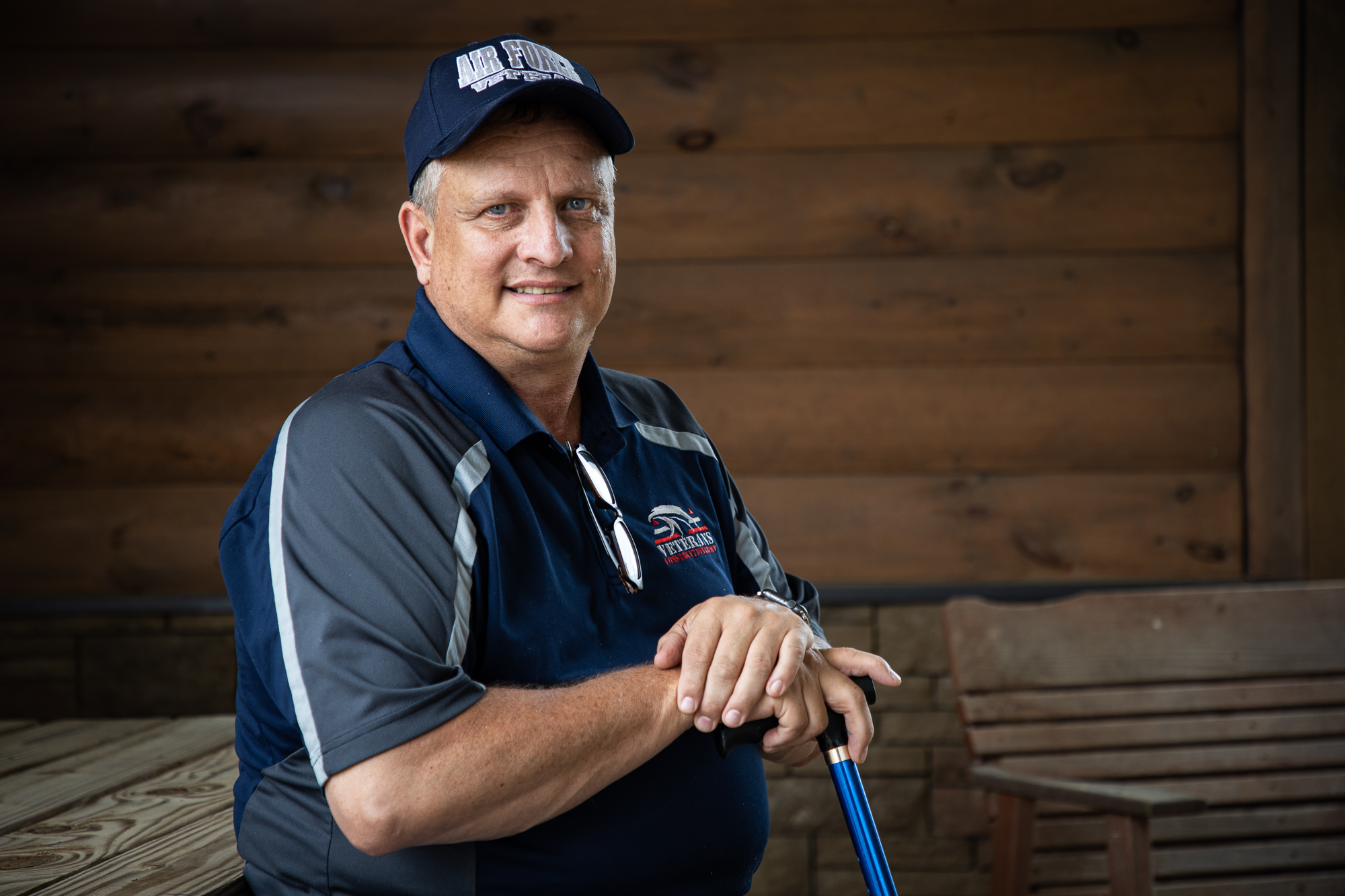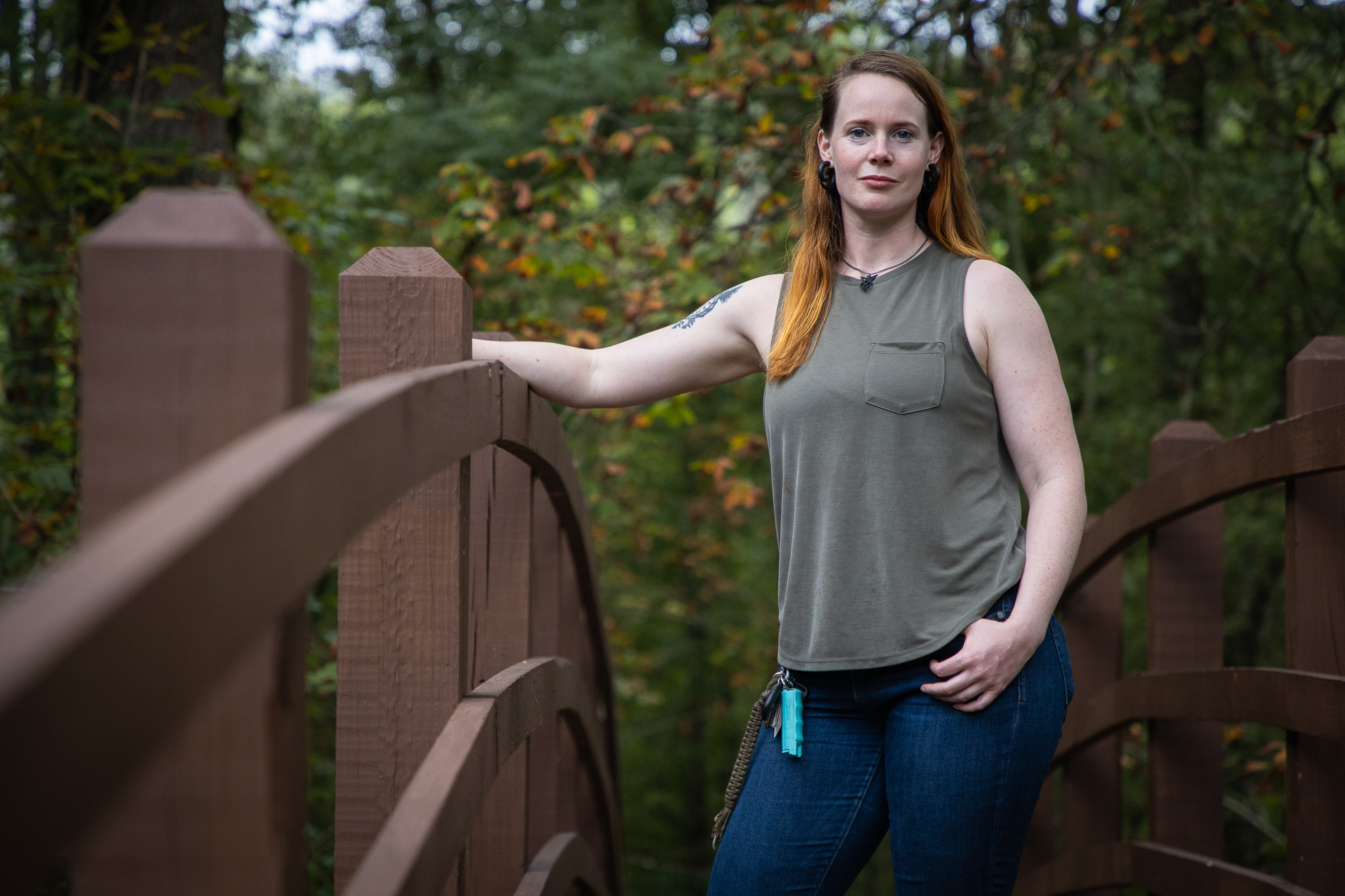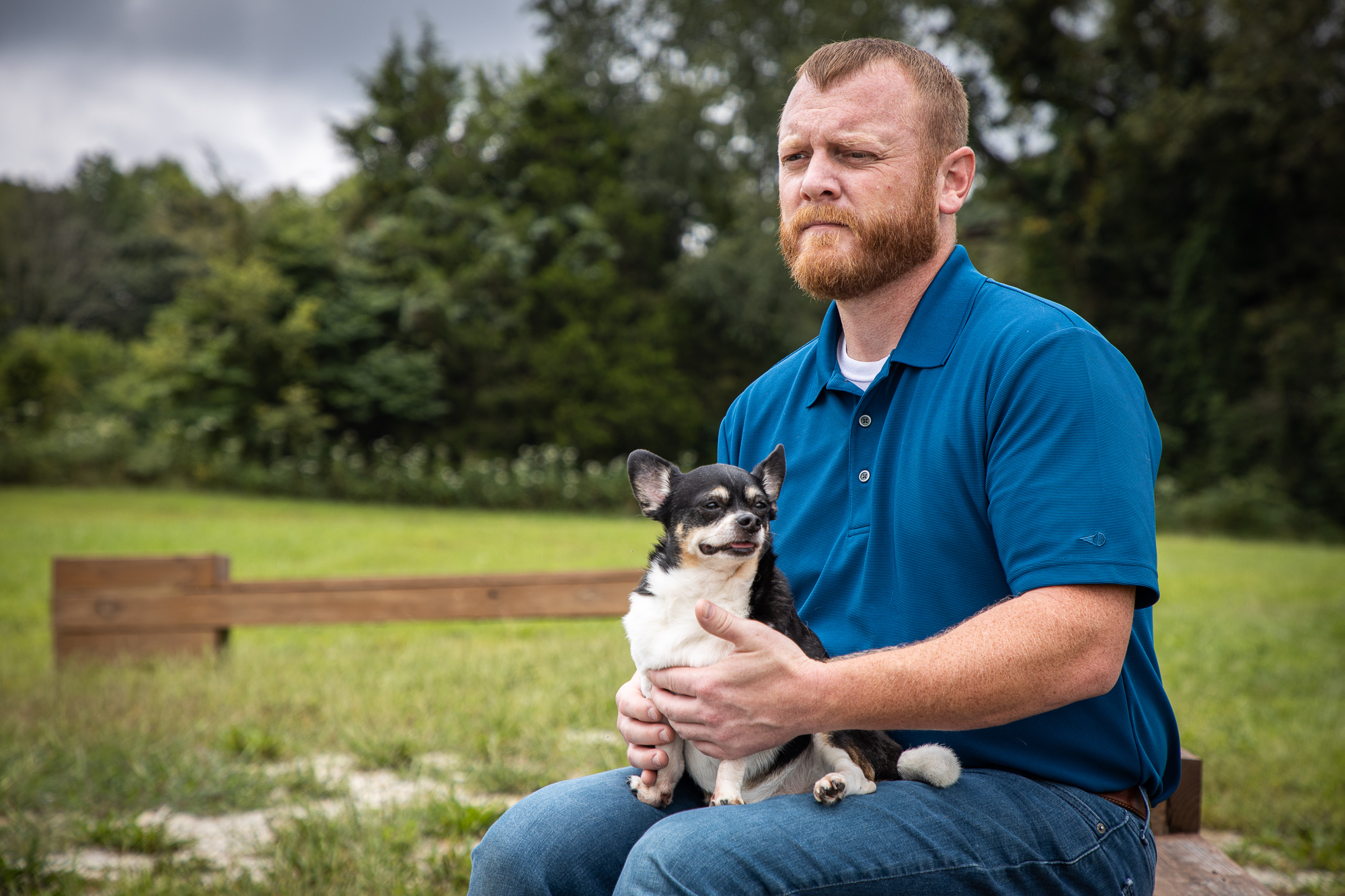This story and testimonials below recall traumatic moments in the lives of the veterans sharing their personal experiences. The Veterans Crisis Line connects veterans in crisis and their families and friends with qualified, caring responders from the Department of Veterans Affairs. Calls are free and confidential: 1-800-273-8255. The National Suicide Prevention Lifeline is available 24/7 to all callers: 1-800-273-8255.
Troy Yocum grew up in a family that was deeply affected by military veteran suicide. His grandfather served in the Pacific during World War II and took his own life in 1980.
“I was one [year old]. So I had no understanding growing up why my grandfather would commit suicide,” Yocum said. “He struggled with post-traumatic stress way before that was a diagnosis or a coined phrase. Back then, it was called shell shock, and you didn’t talk about your feelings and they trained you in the military that pain is weakness and that you flush all that weakness out and you don’t talk about that weakness. You buried it deep inside.”
Yocum gained a better understanding of his grandfather’s experience through his own military service. He enlisted at age 20 and deployed as part of Operation Iraqi Freedom.
“On my tour in ‘04 and ‘05, we had 36 guys in my brigade killed, two of them I knew very well,” he said. “The first year I was back from Iraq, I just couldn’t sleep. I would wake up, and anything I saw in the room, I’d think it’s the enemy.”
On average, approximately 17 military veterans died by suicide per day in 2017, according to a U.S. Department of Veterans Affairs (VA) report released last year. Veterans accounted for 13.5 percent of all suicide deaths in the country, while comprising just under 8 percent of the total population. The highest rate of suicide was found in veterans ages 18 to 34, according to the study, and veterans diagnosed with conditions like traumatic brain injury and PTSD are more likely to commit suicide. Prior reports have listed the average number of daily veteran suicide deaths at 22 and 20.
“They don’t know if these numbers are right or wrong because the reports are kind of inconsistent. You get deaths that are not determined, you get the veterans who get out and they don’t connect with their V.A. services, so they have a hard time tracking those,” Yocum said. “But one veteran suicide is one too many.”
Troy Yocum founded Active Heroes, an organization that sponsors events nationwide and operates a veterans’ community center in Louisville, Kentucky, in addition to the retreat center. “I’m hopeful that years after I’m gone, these places and the places that we hope to build in the future will keep carrying on and help more and more military family members,” he said. [Photo by Jim Tuttle]
To raise awareness and funding to prevent veteran suicide, Yocum walked a 7,888 mile loop around America with his dog in 2010. After 17 months and 12 pairs of shoes, he collected about $1.3 million in donations. The money from his walk went to help military families and to launch his own nonprofit, Active Heroes.
“[The walk] kicked it all off. On a personal level, I’m all about this. This has been my life,” Yocum said. “Whether or not you believe we should be at war, or you have different political beliefs, I think we have to stand behind our veterans and their family members.”
In 2013, the organization was awarded a grant from the Home Depot Foundation, which it used toward the purchase of 147 acres in Bullitt County, Kentucky, about 30 miles southeast of Louisville. Since then, Yocum has been working to transform that land into a peaceful place where veterans and their families can visit for free to enjoy camping, horseback riding, concerts, and other activities.
The first order of business after buying the land was to clear brush from overgrown areas and remove huge piles of trash that had been dumped there over a span of more than 20 years while the property sat vacant.
“There were no roads. There were some old electric poles, but no electricity throughout the retreat and no running water,” Yocum said. “We spent the first two and a half years removing 65 tons of trash by hand with no heavy equipment, just dumpster bags from Wal-Mart, one ATV, and literally hundreds of volunteers.”
Situated on 147 acres, Active Heroes Military Family Retreat is still in the first phase of construction, but already features hiking trails with scenic bridges, an archery range, an amphitheater and two cabins. “We surveyed 3,000 military family members from the very beginning asking them what they wanted out of an outdoor retreat,” Yocum said. “We took the 50 most popular ideas, squashed those down and put them into four phases of construction.” [Photo by Jim Tuttle]
Since then, the property has been slowly transformed to include two cabins, a welcome center, a dog park, an amphitheater, pastures for rescued horses, and hiking trails featuring several bridges. Construction is underway on a pavilion and a petting zoo. The retreat is now welcoming guests and holding events, and Yocum has more that he wants to add on.
But the pandemic has slowed those plans and delayed Active Heroes’ vision for the retreat. Like many nonprofits across the country, the organization has seen volunteer numbers dwindle since March, and fundraising has dropped by about two-thirds compared to previous years, from $1 million to $300,000. Active Heroes typically sponsors about 300 veterans’ events around the country annually, but this year there have been about 35.
Yocum said he’s done his best to cut expenses, but unfortunately had to furlough seven of their 12 staff members.
“We’ve come so far, and we were climbing this ladder really steadily. And then this year happened, and I feel like we’ve gone like half the rungs back down,” Yocum said. “It’s been a struggle. It’s been one of those years where you have to overcome and you have to adapt. You just have to focus on the path, which is to keep helping as many military families as we can while doing so with much less.”
The following are excerpts from conversations with three veterans who visited Active Heroes Military Family Retreat because they crave the peacefulness of being in nature. Each shared their personal experiences with PTSD and their military service. Their stories have been edited for brevity and clarity.
Donald Barbiea: I’m not a tree hugger, but every once in a while I’ll lean up against one.
Donald Barbiea served as a civil engineer in the U.S. Air Force for 24 years, and was deployed seven times to Afghanistan and Iraq. He now owns a construction company that employs retired veterans and volunteers to help with building projects at Active Heroes Military Family Retreat. He attributes his PTSD and anxiety in crowds to a number of combat experiences, including an attack in 2004 on a dining facility at Balad Air Base in Iraq. [Photo by Jim Tuttle]
Coming home is the hardest part because it’s hard to leave what you were experiencing, and it seems to stay with us in the back of our brains. It gets trapped in there, and it likes to sneak out every once in a while at strange times.
And it’s a struggle every day for some people like myself who have severe PTSD, depression, and anxiety. It’s something we live with, and a lot of people just don’t understand.
Picture yourself driving down one of the streets in town, going to get dinner, and you’ve got a buddy with you. And all of a sudden, out of the blue, there’s a mortar rocket hitting 50 yards in front of you on the road. The response is you dodge it, and then try to recover.
When you get to dinner, which is only a quarter mile away from where you just had this experience in the middle of the road, you’re walking into a restaurant, and the building just starts getting shook from mortars. One after another, maybe five to seven times. And then everybody in the restaurant is coming through the doors at you like a herd of cattle, a stampede, all trying to get away.
People are rushing out at you, and there’s just explosion after explosion after explosion. And it’s hitting right where you’re at. And then you get somewhere you think you’re safe, and you realize this might be it. Something bad’s about to happen, and you find yourself saying goodbye to your family in your thoughts.
You do that couple hundred times, and it kind of messes you up a little bit. You might not even understand it though, because you have such an adrenaline rush at the time.
Then after you’re home for a couple of years, you’re sleeping, and all of a sudden you’re fighting silhouettes in the night. Then somebody says, ‘Wake up, wake up,’ and that silhouette has got a voice. And then you’re sitting up in your bed swinging at this voice and you make contact with something. It’s not just a silhouette, it’s really there.
Once you come to, you find out you were actually punching your wife’s back. Then you start to realize you have some problems, and you fight those for the rest of your life. Those dreams keep coming back.
Nature is healing. It’s just the peace and the freedom. You can see deer running around here, and they’re not being threatened, and just water moving is peaceful to us. You find a creek that’s got a little bit of a waterfall and you can just stand there. It’s amazing what it’ll do for you.
I’m not a tree hugger, but every once in a while I’ll lean up against one.
Arline Litchfield: My life can’t be any worse going forward than it has been in the past.
Arline Litchfield has served in the Army National Guard since 2008, first in Minnesota and currently in Kentucky. She’s gone through Officer Candidate School twice and has held several jobs in the military, including Chemical, Biological, Radiological, and Nuclear (CBRN) Officer. She was deployed to Kuwait with an aviation unit in 2014. [Photo by Jim Tuttle]
I was diagnosed with PTSD earlier this year, right before COVID. Great time to start a healing plan. But I had been suffering the symptoms, and I had PTSD for a long time before I was diagnosed and started getting treatment for it.
I have found a unique amount of therapy in physical challenge that helps to offset the mental pain, because I’ve always felt like there’s nothing you can physically make me do that will ever hurt as much as my mind has hurt. No workout can ever make me suffer as much as I have mentally suffered in the past.
I compete in the sport of strongman. There’s a lot of things about it that tie so closely to helping me manage my PTSD, and helping me manage life, and becoming a higher-performing individual in general. Part of that one is just the day in, day out, going to the gym, picking heavy things up and putting them back down again, and being disciplined enough to stick to a training plan.
But on top of that, competing in this sport is not about who’s strongest. It’s about who can overcome their mental obstacles and who can overcome their fears the best that day. Exercising that has been huge for my ability to just manage the stuff that comes my way in everyday life, but also performing under immense pressure in my military job.
And I know it’s going to be a lifelong struggle, but it already has been. My life can’t be any worse going forward than it has been in the past. So, if you need help, get it, because it can come to you in a million different forms, and if going to a retreat like this is one of those, then do it.
I don’t want to speak for all female service members who have endured military sexual trauma, but for a lot of us, we seek solitude because, ultimately, we have not been left alone. That’s kind of the nature of our trauma — that somebody has not respected our personal boundaries in a million different ways. And so, seeking solitude and being someplace like this with trees and nature and critters who don’t disrespect your boundaries the way humans do is really refreshing.
Being able to come out and do your own thing and feel safe, especially with the location and seeing all the security cameras and the signs and everything like that – those are cues to me that this is a place where I can feel safe. The access is controlled, and that is huge to me.
There is so much of human biology and psychology that is attuned to nature, and much of our modern lifestyle ignores that or doesn’t take that into account. We often feel ailments of the soul that we don’t really know how to fix, and time and nature can help to heal that so much. That’s something that I feel really strongly in myself.
James Killen: If there’s one thing you can give me, it’s peace.
James Killen served five years of active duty in the U.S. Marine Corps and more than 12 years with the Kentucky Air National Guard. He deployed twice to Iraq between 2003 and 2005, and was also involved with the emergency response to Hurricane Katrina in 2005. One of his favorite features at the retreat is a dog park where he can bring his chihuahua, Sammy. [Photo by Jim Tuttle]
I would never want to go to a populated public dog park. I just wouldn’t. There’s too many people, there’s too much unpredictability, and those are some of the things I brought back with me.
My first tour, I was just getting used to the Marine Corps, and we got thrown into a combat situation. You’ve got a lot of people who’ve never seen combat before, and it makes them extremely edgy, extremely jumpy.
It’s real, and you have to act. You can’t just sit there. I remember grabbing a Marine by his collar, trying to get him to get his gas mask on because he was losing his mind. I mean, when you see a grown man lose his mind, that stuff messes with you.
When we got into Jalula (35 miles outside of Baghdad) — my blood pressure is coming up just talking about it — but when we got into Jalula, there was nothing. We had no showers. I was wearing the same clothes. I remember having to crunch my socks up just to get them on because we hadn’t washed our clothes in almost a month. I hadn’t had a shower in almost 50 days — And that’s not even including the skirmishes, and the mortars, and the firefights, and the bullets whizzing past your helicopter, and things like that.
It’s not even that. It’s the fact that you have to deal with stuff that you’ve never dealt with in your entire life and no normal, rational human being would ever want to deal with. That was the issue with the first tour. And the second tour was just, I mean, it was constant. You never knew if the car passing you was gonna blow up.
So, what keeps me calm, what keeps my blood pressure down, what helps me think clearly is peace and quiet and being able to control my thought process. I’ve told everybody in my life: if there’s one thing you can give me, it’s peace. That’s it. Just let me be.
I used to work for the Department of Veterans Affairs and Disabled American Veterans, two organizations that are intently focused on veteran suicide. I think if veterans had more places where they thought that they were heard, where they didn’t think that they were judged for the thoughts they had, I think we would see that number drastically decrease.
There’s a place you can go just to decompress, and that is right out here, literally in the middle of nowhere, which is a wonderful thing in my opinion. I love this property, I love this retreat. I think it’s gorgeous.

